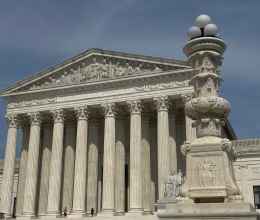By Julian Camera, Field Organizer
Yesterday, Aimee Stephens, Don Zarda, and Gerald Bostock won. The LGBTQ+ community won. Hope, justice and humanity won. The Supreme Court ruled that it was against the law to fire our clients — fire anyone — for being LGBTQ+. This landmark victory was the result of decades of work by LGBTQ+ people fighting for the right to exist. It belongs to Aimee, Don, and Gerald, and innumerable individuals who spoke up and spoke out against discrimination.
To rule that employers don’t have the right to discriminate based on gender identity seems like an obvious decision but many of us in the LGBTQ+ community were prepared for a much different outcome. With the Trump administration’s constant attacks on LGBTQ+ rights and recent removal of healthcare protections for transgender people in the Affordable Care Act, our community has been in a battle to exist.
Up until yesterday, thirty-one states lacked civil rights protections for transgender people. Now we are protected at work nationwide.
Some background on the case:
In 2013, Aimee Stephens, a transgender woman, presented her boss a beautifully written letter where she expressed to him that she was transgender and could no longer hide her true identity. Her employer, the director of the funeral home, fired her, stating that her identity would be a distraction to clients and visitors.
After losing a career she loved, income and health insurance, Aimee knew that she didn’t want any other trans person to feel the same pain. She filed a claim with the U.S. Equal Employment Opportunity Commission who agreed that she was discriminated against by her employer and was protected under Title VII of the Civil Rights Act which says that you cannot fire someone based on their sex.
Her former employer appealed the decision all the way to the U.S. Supreme Court where her case was one of the first to directly address transgender civil rights.
Sadly, Aimee Stephens passed away on May 14th, 2020 and did not live to hear the results of her case. While not intending to do so, Aimee became a hero for our community. We will continue to honor Aimee by sharing her story and highlighting the deep transphobia that exists in our country where only 22 states have protections for trans people.
Where does Colorado stand?
In Colorado, the Colorado Anti-Discrimination Act has protected transgender employees since 2008. The history of LGBTQ+ rights in Colorado is fascinating. We’ve transgressed from one of the most anti-LGBTQ+ states in the nation to one of the most progressive. The road here was not easy and even with legal protections, transgender people still lack experience harassment and hostile treatment, especially transgender women.
A Brief History:
Prior to the arrival of white people and their almost complete displacement of Native people in 1859, Indigenous tribes in Colorado were known to acknowledge and highly value a third umbrella of gender and sexuality called niizh manidoowag or two-spirit. This term was used to describe people who were not bound by gender or sexual binaries.
Once white people arrived in Colorado, very strict laws were put in place that regulated how people could dress in public. Most historical records of LGBTQ+ people from this time are arrest reports of those who publicly appeared in clothing that did not align with the gender they were assigned at birth.
Over the course of the next hundred years, gay men became the targets of discriminatory laws and violence and at the same time, a defined community. Society at the time had a great dislike for homosexual people and the community was mostly underground.
That began to change one summer night in June 1969 when police did a routine raid of a gay bar in New York City and people at the bar, including Marsha P. Johnson and Sylvia Rivera, said, “no more.” The standoff between LGBTQ+ people and the police at Stonewall Inn set the tone for a new movement in the fight for Civil Rights. Hundreds of thousands of people across the country mobilized to undo laws that targeted gay and lesbian people.
As I read about gay organizations that formed and protests that were organized, I searched extensively for the recognition of transgender people in the fight for LGBTQ+ equality in Colorado. There was little to none in any mainstream historical records.
But we know that transgender people, specifically women and women of color, were not only present in the fights for equality, but helped organize and lead these fights. In the midst of a demand for equal rights, transgender people were placed under the umbrella of sexual identity and were therefore neglected in societies growing acceptance of LGBTQ+ people.
Because of Aimee Stephens’ case, the neglect of the trans community has come to the forefront of social justice consciousness. One would be baffled to imagine that gay and lesbian people were prohibited from engaging in certain sexual acts not even 50 years ago.
Even in states where there are legal protections, transgender women still fear for their lives. A friend of mine who lives in a Colorado mountain town is preparing to start hormone therapy and would rather leave her male-dominated job than come out and face possible harassment, even though she is protected by the Colorado Anti-Discrimination Act.
Laws are not created without people fighting for them. Now that LGBTQ+ people are protected in the workplace, we must continue to fight for the welcoming of transgender people in every corner and crescent of our country. Colorado came to have the protections that we do because many people gathered and fought-in the streets, in elections, and in our communities to have our voices heard. Right now, the transgender community needs support. Together, by uplifting our trans neighbors, co-workers, family members, and friends we can create a welcoming world for them.
If you want to help push for explicit and consistent LGBTQ+ rights nationwide, email your senator and ask them to support The Equality Act. Seven out of ten Americans believe in LGBTQ+ equality but nearly two-thirds of LGBTQ+ people still report having experienced discrimination in their daily lives. It’s up to all of us to fight for the country we want to live in. It’s up to all of us to fight like Aimee.


